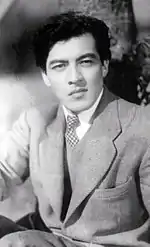Rentarō Mikuni
Rentarō Mikuni (三國 連太郎, Mikuni Rentarō) (also sometimes credited 三国連太郎; ; January 20, 1923 – April 14, 2013) was a Japanese film actor from Gunma Prefecture. He appeared in over 150 films since making his screen debut in 1951, and won three Japanese Academy Awards for Best Actor, and a further seven nominations. He also won two Blue Ribbon Awards for Best Actor, in 1960 and in 1989.[1][2] The 1987 film Shinran: Path to Purity (親鸞:白い道), which he wrote and directed, was awarded the Jury Prize at the Cannes Film Festival.[3] Actor Kōichi Satō is his son.
Rentarō Mikuni | |
|---|---|
 around 1950s | |
| Born | Masao Sato January 20, 1923 Gunma, Japan |
| Died | April 14, 2013 (aged 90) |
| Occupation | Actor |
| Years active | 1950–2013 |
| Height | 1.81 m (5 ft 11 1⁄2 in) |
| Children | Kōichi Satō |
Biography
Mikuni was born the son of a woman who had become pregnant while working as an indentured servant. His mother then married an electrician who had learned his trade while serving in the military, the man Mikuni considered his father. His stepfather was a member of the burakumin, and Mikuni experienced prejudice as a child, such as automatically being suspected of theft when a bicycle was stolen. He was educated to elementary school level and hoped to then start work with his father, but his father insisted that he should attend middle school. Part way through middle school Mikuni dropped out and left home. He was repeatedly sent home from Tokyo by the police. Finally he escaped and from the age of sixteen to twenty, where he wandered around Japan and Korea (then under Japanese control) doing a variety of jobs. At the age of twenty he received a call-up papers for the Japanese military.[4]
Mikuni attempted to evade the call-up but was arrested by police after his mother informed on him. Instead of being punished he was simply sent to serve in China. He served his time in a unit of unfit and incompetent soldiers, and never fired a weapon at the enemy.[4]
After returning to Japan, he drifted between odd jobs. His career as an actor started when he was asked to do a screen test by a scout. At the time he had no intention of becoming an actor and did the test merely because he was promised some meal tickets.[n 1][4]
He took his stage name from his first role in the 1951 film The Good Fairy directed by Keisuke Kinoshita, for which he won the Blue Ribbon award for best newcomer.[5]
He died in 2013 of acute cardiac failure.[5] In accordance to his wishes, he doesn't need a posthumous dharma name.
Filmography
- The Good Fairy (1951)
- Husband and Wife (1953)[6]
- Samurai I : Musashi Miyamoto (1954)
- Keisatsu nikki (1955)
- A Hole of My Own Making (1955)
- The Burmese Harp (1956)
- Ruri no Kishi (1956)
- Night Drum (1958)
- Kiku to Isamu (1959)
- The Catch (1961)
- Harakiri (1962) – Saitō Kageyu
- Wolves, Pigs and Men (1964)
- Kwaidan (1965)
- A Fugitive from the Past (1965)
- Zatoichi the Outlaw (1967)
- The Profound Desire of the Gods (1968)
- Coup d'État (1973)
- Himiko (1974)
- Akai Unmei (television) (1976)
- Kiri-no-hata (1977)
- Hakkodasan (1977)
- Never Give Up (1978)
- Vengeance is Mine (1979)
- Ah! Nomugi Toge (1979)
- Sailor Suit and Machine Gun (1981)
- The Go Masters (1983)
- A Promise (1986)
- Shinran: Path to Purity (1987 - directed)
- A Taxing Woman 2 (1988)
- Tsuribaka nisshi (1988)
- Wuthering Heights (1988)
- Rikyu (1989) – Sen no Rikyū
- Tsuribaka nisshi 3 (1990)
- Tsuribaka nisshi 2 (1989)
- Tsuribaka nisshi 4 (1991)
- Musuko (1991)
- Luminous Moss (1992)
- Tsuribaka nisshi 6 (1993)
- Daibyonin (1993)
- Tsuribaka nisshi 7 (1994)
- Mitabi no kaikyô (1995)
- Oishinbo (1996) – Yūzan Kaibara
- Will to Live (1999)
- Taiga no itteki (2001)
- Chronicle of My Mother (2012)
Selected television appearances
- Hissatsu Shikakenin (1972) - EP.6
- Sekigahara (1981) – Honda Masanobu
Honours
Notes
- 食券
References
- ブルーリボン賞ヒストリー (in Japanese). Cinema Hochi. Archived from the original on 2010-02-02. Retrieved 2010-04-08.
- ブルーリボン賞ヒストリー (in Japanese). Cinema Hochi. Archived from the original on 2009-02-07. Retrieved 2010-04-08.
- "Festival de Cannes - From 15th to 26th May 2013". Festival de Cannes. Retrieved 2013-04-15.
- Mikuni, Rentaro. Ikizama Shinizama [Way of life, way of death]. ISBN 4-8454-2071-6.
- "Rentaro Mikuni, movie actor and director, dies at 90".
- "夫婦(1953)". Japanese Cinema Database. Retrieved January 31, 2021.